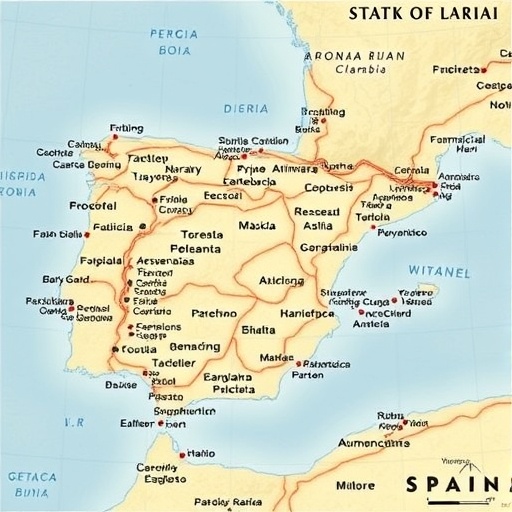Universidad Carlos III de Madrid (UC3M) has unveiled an innovative and interactive geolocation catalogue that maps cities in Spain and Latin America bearing names from Greco-Roman antiquity or those likened to ancient classical cities. This pioneering digital initiative is a cornerstone of the ANTIMO research project, aimed at providing fresh insights into the processes of modernization, societal progress, and the construction of political paradigms via allusions to classical civilizations. This comprehensive registry not only sheds light on the enduring legacy of Greco-Roman nomenclature but also serves as a groundbreaking academic tool, harnessing the power of geospatial technologies and metadata standardization.
The catalogue’s scope is both broad and nuanced, extending beyond the commonly referenced ancient metropolises of Athens and Rome. Mirella Romero Recio, the principal investigator and director of UC3M’s Julio Caro Baroja Institute of Historiography, explains that the team has currently identified over 200 relevant cities, with expectations of discovering further examples. Intriguingly, the database also includes geographical regions that, while not formal urban centers, evoke classical antiquity either through their names or historical-political associations, thereby enriching the conceptual framework of the project.
Technologically, the resource integrates advanced search functionalities, enabling users to explore entries by both ancient and contemporary names. The interface features map and virtual globe visualizations, allowing for spatial contextualization of each locality. Upon selecting a city, users access detailed dossiers that meticulously link the place name to its classical antecedents and document the original textual references citing such connections. This process underscores the project’s commitment to rigorous source verification and historical accuracy.
A critical element underpinning the robustness of the catalogue is the collaboration with UC3M’s Library of Humanities, Communication and Documentation, which has been instrumental in implementing metadata standards. Teresa Boyer Lagos, the library director, highlights the adoption of the Dublin Core international metadata standard as a major achievement. By mapping the diverse data sets to this universally recognized schema, the project ensures interoperability and positions itself for seamless integration into broader scientific repositories and open data ecosystems, thereby facilitating future scholarly accessibility and data sharing.
The ANTIMO project builds upon earlier foundations laid by the RIPOMPHEI initiative, which examined the symbolic role of Pompeii in shaping the imaginations of Ibero-American elites, viewing the ancient city as a potent emblem of modernity and a distancing from colonial legacies. The current project expands these conceptual investigations to analyze how references to Greece and Rome transcend mere toponymic exercises, becoming deployed as instruments in multifaceted historical and political narratives.
Central to the team’s research findings is the observation that parallels drawn with Athens and Rome function beyond simplistic urban metaphors. Athens is frequently invoked by cities aspiring to cultural prestige, especially in the realms of arts and literature. Conversely, Rome is emblematic of political authority and economic dominance, features cities seek to emulate to assert their status. However, recent years have witnessed more complex and sometimes troubling appropriations of Roman imagery, with some political actors nostalgically invoking authoritarian models from antiquity to justify reactionary, often masculinized, visions of power.
This nuanced examination reveals that classical legacies are not fixed or purely celebratory but can be actively instrumentalized to support divergent and even conflicting ideological agendas. This dynamic underscores the critical importance of contextualizing the invocation of ancient models within contemporary discourses, allowing researchers to uncover the layers of meaning and motive embedded in such rhetorical deployments.
Looking forward, the ANTIMO research team is prioritizing the incorporation of gender perspectives into their analysis. One key objective is to reveal and amplify the roles of women throughout history who employed classical antiquity’s legacy as a platform to advocate for their rights, education access, and political participation. This gender-focused inquiry promises to add a vital dimension to understanding how classical references have intersected with struggles for equality and social transformation.
The technical sophistication of the project is matched by its interdisciplinary ethos, involving historians, librarians, geographers, and data scientists. The collective expertise ensures that the catalogue is not only historically grounded but also resilient in terms of data architecture and user experience. The inclusion of geospatial tools coupled with comprehensive metadata curation exemplifies a vanguard approach to digital humanities, setting a model for similar initiatives worldwide.
Funding for the project derives from Spain’s Ministry of Science, Innovation and Universities, the Spanish State Research Agency, and the European Regional Development Fund (ERDF). This support underscores the importance of integrating historical-cultural research within national and European scientific priorities, recognizing its contribution to both academic knowledge and broader societal conversations about identity, heritage, and progress.
In summary, the UC3M’s ANTIMO catalogue constitutes a significant advancement in both humanities research and digital scholarship. By enabling the precise geolocation and thorough documentation of cities linked to Greco-Roman antiquity, it opens new avenues for exploring how classical civilizations continue to shape modern identities and political imaginaries across Spain and Latin America. This project not only preserves historical knowledge but actively engages with the contemporary implications of invoking antiquity, marking a vital contribution to understanding the dynamics of cultural memory in the modern world.
Subject of Research:
Geolocation and historical analysis of cities in Spain and Latin America named after or compared to Greco-Roman antiquity; exploration of classical references in political and cultural modernization.
Article Title:
New Interactive Catalogue Traces Greco-Roman Legacies in Modern Cities of Spain and Latin America
Image Credits:
The_Double_A in Pixabay
Keywords:
Human geography, Greco-Roman antiquity, geolocation, classical legacy, digital humanities, political symbolism, cultural modernization, metadata standardization




